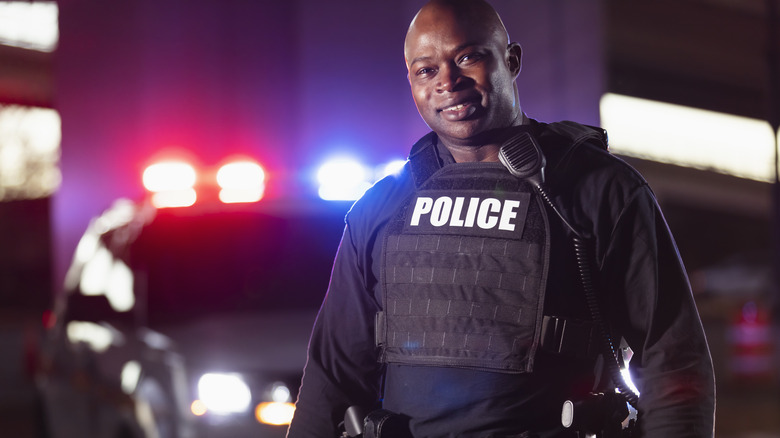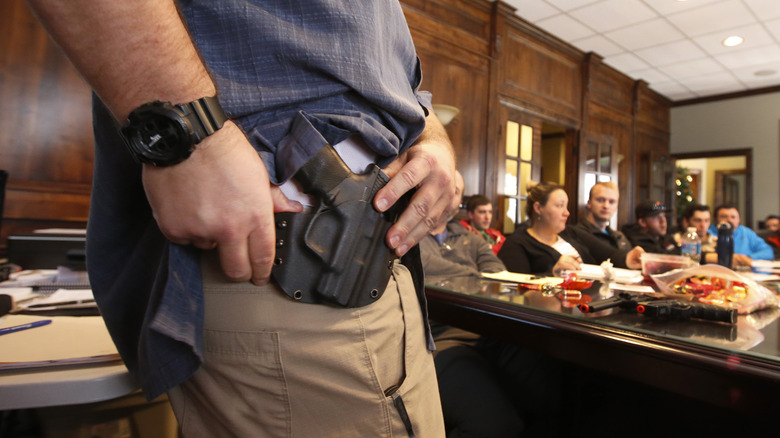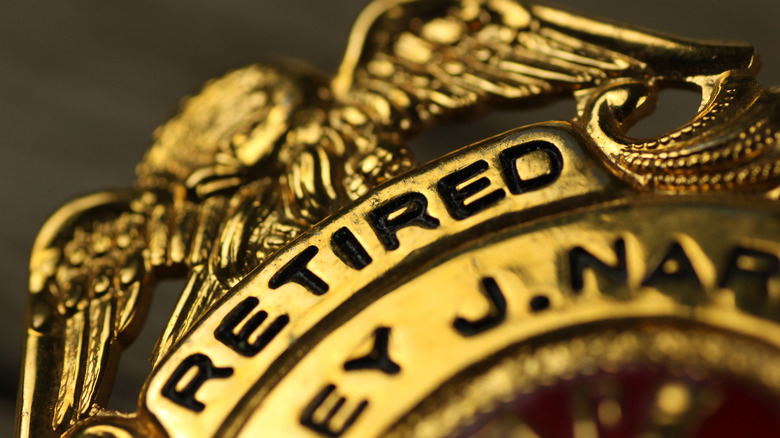Can Retired Police Carry A Gun And Badge?
A cop's badge and gun are symbols of power and authority, that, if wielded unjustly can cause a lot of harm. Impersonating an officer is obviously a pretty serious crime — but what if you once were one?
It can be surprisingly hard for people who have spent a lifetime in blue to assimilate to civilian life. So much so that the IACP — the International Association of Chief of Police, has published guidelines to help ex-officers adjust. Yet ex-police officers actually do retain some privileges that ordinary civilians do not have — albeit they are quite limited. Following retirement, officers may wish to let the world know they were once on the force — and in some ways — they can.
The laws regarding gun privileges, for example, are fairly lenient for retirees and were changed under George W. Bush in 2004, with the Law Enforcement Officers Safety Act (LEOSA), allowing ex-cops more gun rights. Under the terms of this act, officers who have left the force "in good standing" are awarded an unusually high level of trust.
Concealed carry for ex-cops
According to the NRA, the Law Enforcement Officer Safety Act (LEOSA), allows retired officers to carry concealed weapons after retirement in any U.S. State or territory. However, there are a few caveats to this rule, and officers should apply for special LEOSA photographic identification first, and take the pre-requisite firearms test.
Although the concealed carry law applies regardless of which state the ex-officer is in — there are places where an ex-cop can be told to put the gun down. Any person can refuse a retired officer the right to carry a gun on their private property for example, and LEOSA rules do not apply to common gun-free zones such as schools and national parks. Carriers must pay attention to such restrictions, which are often in place in federal government buildings. Flying with a gun is also a big no-no — and applies as much to retired officers as it does to everyone else.
Cops who have gone over to the dark side — also waive their rights under LEOSA. Anybody convicted of a criminal offense punishable by a year or more in jail, cannot carry, nor can anybody subject to a court order for stalking or harassing and threatening an intimate partner or child. Other common prohibitions that limit gun ownership rights — such as mental illness, and being high on illicit substances, naturally, still apply to ex-police officers.
Rules regarding badges
The exact rules vary a little from state to state but officers typically do get to keep a badge in some form. According to the California Municipal Code, ex-cops may carry any badges they have been awarded during the course of their career until their dying day. However — the badge must be clearly emblazoned with the word "RETIRED" — and this is also the rule in many other places.
In West Virginia for example, the West Virginia Legislature decrees that an officer may carry a special retirement badge and ex-cops can even keep their uniform. In Texas, on the other hand, officers from the Houston City Police Department may be awarded a special retirement ID card, and they can keep their badges and hat shields upon written request. Old badges must be permanently fused to a plaque "or other form of display."
Retirement badges do not award any sort of authority, however. While it may be tempting for some ex-officers to whip out their law enforcement credentials when coming across a tricky situation in normal life — badge or no badge, ex-cops do not have the power of arrest.


